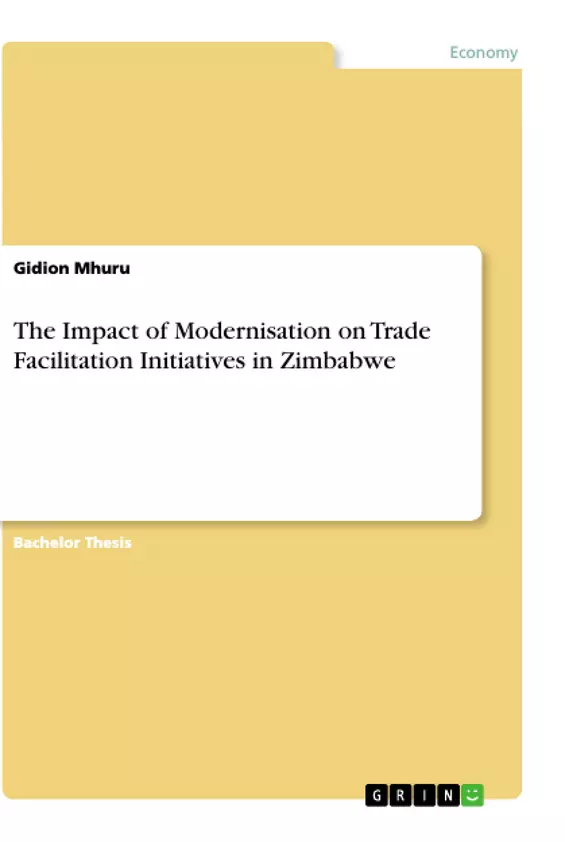The research was aimed to establish the impact of customs modernisation on trade facilitation initiatives implemented by ZIMRA and the relationship between modernisation of customs procedures and economic growth as well as the challenges being faced by the Customs Administration in its objective. The research seeks to answer the following questions: To what extent does the economic environment have any bearing on the modernisation procedures in Customs Administration? How relevant is the Customs legislation in support of modernisation of customs trade facilitation initiatives? Has ZIMRA achieve its intended goals towards embarking on modernizing its Customs operations? What is the impact on various stakeholders, for instance, importers, exporters and the Zimbabwean government? What are the benefits and costs of trade facilitation? What is the relationship between trade facilitation and economic development?
The implementation of customs reforms is a topical issue in the customs modernisation field to the extent that the donor community has been funding the projects in many developing countries. However, the greatest challenge is on to the extent to which they affect trade facilitation initiatives. Modernisation of trade facilitation initiatives has been described as the key to sustainable economic development and thus a poverty reduction tool. Zimbabwe has not been seen to be much committed to trade facilitation, instead, it has been characterised by cumbersome and complicated trade procedures, which have worked against trade facilitation in most third world countries. Some of the modernisation initiatives proposed are not being fully utilised. Thus the researcher seeks to evaluate the consequences of those initiatives if implemented in the Customs Administration. Zimbabwe’s economy is backed up by trade with other countries and is also used as a transiting country which links trade between various other countries.
Inhaltsverzeichnis (Table of Contents)
- Purpose of project
- Dedication
- Acknowledgements
- Abstract
- Acronyms
- Chapter One: Introduction
- 1.1 Background of the Study
- 1.2 Statement of the Problem
- 1.3 Objectives of the Study
- 1.4 Research Questions
- 1.5 Significance of the Study
- 1.6 Scope and Limitations of the Study
- 1.7 Definition of Terms
- Chapter Two: Literature Review
- 2.1 Trade Facilitation Initiatives
- 2.2 Modernisation of Customs Procedures
- 2.3 Impact of Modernisation on Trade Facilitation Initiatives
- Chapter Three: Research Methodology
- 3.1 Research Design
- 3.2 Population of the Study
- 3.3 Sampling Procedure
- 3.4 Data Collection Instruments
- 3.5 Data Analysis Techniques
- Chapter Four: Data Presentation and Analysis
- 4.1 Introduction
- 4.2 Data Presentation
- 4.3 Data Analysis
- Chapter Five: Findings, Discussion, Recommendations and Conclusion
- 5.1 Introduction
- 5.2 Findings of the Study
- 5.3 Discussion of Findings
- 5.4 Recommendations
- 5.5 Conclusion
- Bibliography
- Appendices
Zielsetzung und Themenschwerpunkte (Objectives and Key Themes)
This research project examines the impact of modernising customs procedures on trade facilitation initiatives implemented by the Zimbabwe Revenue Authority (ZIMRA). It investigates the relationship between customs modernisation and economic growth in Zimbabwe, while also identifying challenges faced by ZIMRA in achieving its objectives. The project aims to assess the value of modernised customs procedures to the Zimbabwean economy, considering the impact of various initiatives such as the One Stop Border Post concept, Direct Trader Input, and automated systems.
- The impact of modernising customs procedures on trade facilitation initiatives in Zimbabwe.
- The relationship between modernised customs procedures and economic growth in Zimbabwe.
- Challenges faced by ZIMRA in implementing modernised customs procedures.
- The value of modernised customs procedures to the Zimbabwean economy.
- The effectiveness of various modern customs initiatives, such as the One Stop Border Post concept, Direct Trader Input, and automated systems.
Zusammenfassung der Kapitel (Chapter Summaries)
Chapter One provides an introduction to the research project, outlining its background, objectives, research questions, significance, scope, and limitations. It also defines key terms used throughout the study. Chapter Two presents a comprehensive literature review on trade facilitation initiatives, modernisation of customs procedures, and the impact of modernisation on trade facilitation initiatives. Chapter Three focuses on the research methodology employed, outlining the research design, population, sampling procedure, data collection instruments, and data analysis techniques. Chapter Four presents and analyses the collected data, examining the findings and drawing relevant conclusions.
Schlüsselwörter (Keywords)
The research focuses on the impact of modernisation on trade facilitation initiatives, specifically in the context of Zimbabwe. Key themes include customs modernisation, trade facilitation, economic growth, ZIMRA, One Stop Border Post concept, Direct Trader Input, automated systems, and the value of modernised customs procedures to the Zimbabwean economy. The research explores the challenges faced by ZIMRA in achieving its objectives related to customs modernisation.
Frequently Asked Questions
How does customs modernisation impact trade in Zimbabwe?
Modernisation aims to streamline complicated trade procedures, reducing delays and costs for importers and exporters, which is key to sustainable economic development.
What is the role of ZIMRA in trade facilitation?
ZIMRA implements initiatives like automated systems and Direct Trader Input to speed up border clearances and improve the efficiency of customs operations.
What is a One Stop Border Post (OSBP)?
An OSBP is a concept where exit and entry formalities are handled at a single location, reducing transit times for goods moving through Zimbabwe to other countries.
What are the main challenges for customs reform in Zimbabwe?
Challenges include cumbersome legislation, economic instability, and the need for full utilization of proposed modernisation initiatives by all stakeholders.
Does customs modernisation lead to economic growth?
Yes, by facilitating smoother trade and reducing bottlenecks, modernisation acts as a poverty reduction tool and supports Zimbabwe's role as a regional trade hub.
- Quote paper
- Gidion Mhuru (Author), 2012, The Impact of Modernisation on Trade Facilitation Initiatives in Zimbabwe, Munich, GRIN Verlag, https://www.grin.com/document/541114



